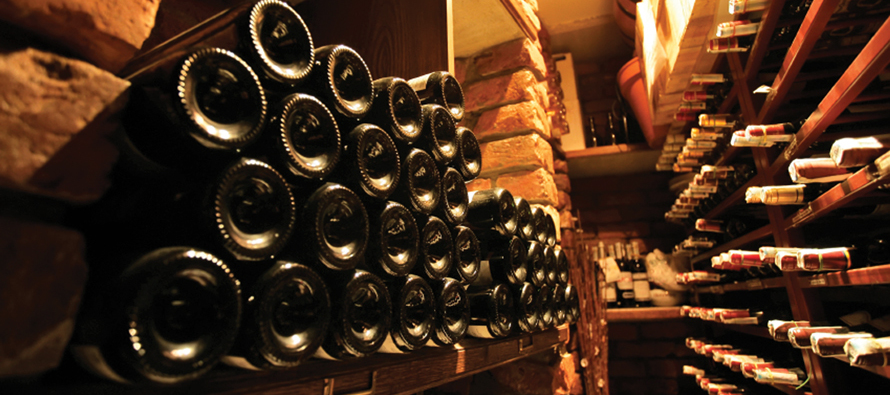Hunters & Collectors: A Case for the Cellar

Admit it. Running off to a wine shop or the grocery store every time you need a bottle or two for the weekend is not all that thrilling. It would be so much easier to have your own supply on hand and readily available without having to pre-plan your every sip. And wouldn’t it be nice to accumulate a small arsenal of more expensive, special wines – ones that can lay down for a few years?
As your enjoyment and appreciation of good wine grows, so does your desire to have you own private stash. Once you were a mere consumer. Now you are a hunter and collector.
The ultimate indulgence for the wine aficionado may well be the wine cellar. Designing your own personal wine cave and filling it over time with hand-picked selections can be a thrill. And best of all, it is all yours.
For some, a cellar is simply a place to store a few bottles for whatever occasion may arise within the next few weeks. It is easy access, convenient, and sometimes it is fun to discover a few bottles of something that we forgot we owned. A cellar may be a simple rack or a box in a basement closet. For many, a cellar is just a pantry stocked with vino instead of mac and cheese while for others, the home wine cellar is a trophy room. It is an opportunity to display one’s sophistication, success and prized purchases. Your bottles are show ponies for the golf-clapping invitees who may on occasion grace the premises. A cellar may have more controls on air quality, temperature, lighting and security than any other space in your home. And based on square footage, it may quite possibly be the most expensive room in the house. It can be idolatry at is finest.
So, exactly which type of hunter and collector are you? Are you simply one step beyond the buy-on-the-fly consumer you once were, in need of a simple place to stockpile a few bottles to get you through the winter months, or do you thirst for a true showpiece? Most wine lovers lie somewhere in between.
Whichever one you are, there are a few considerations to keep in mind when planning your cellar. While most people would agree that a large, well-stocked cellar is truly impressive, herein lies the most costly of mistakes. A few hundred bottles of racked wine may look great, but do the math – the dollars add up quick. If money is no object and you are content to store unlimited quantities of the best juice money can buy, then your problems are over. As for the rest of us mere mortals, the number of wines we choose to cellar should depend directly on how much we consume. A cozy closet space tastefully done is often times more impressive and practical than a large – and largely empty – wine room. Bigger is not always better.
Your ‘everyday’ wines are meant to be consumed within a year – maybe two. Buy those wines liberally, knowing that those corks will be popped freely and often. As for the collectibles, unless you can consume the vast majority of these within roughly five years you will eventually buy yourself into a corner, whereby you may have to quit purchasing wine until you have gone through your stockpile.
Trust me when I say that there are few wine experiences more disheartening than popping a bottle of aged wine only to discover that you have sat on it too long. The quantity of wines you purchase for laying down long-term should not be a function of the amount needed to fill the cellar. Empty racks can always be filled with the everyday stuff. Buy according to your usage, not simply to fill the empty slots.
Know that a cellar is meant to store wine for future consumption. If your wine in storage never leaves the cellar and becomes a permanent showpiece, you do not have a wine cellar, you have a museum. You don’t want that. Great wine can improve with age, but wait too long and you will have the most expensive collection of salad dressing imaginable. Rule of thumb: If you won’t pour ‘em, don’t store ‘em.
One aesthetically appealing nuance for a cellar is to adorn the space with a few photos, wine books, and even empty bottles of special wines as mementos of past occasions. If your space is large enough, you may even place a wine barrel or small bistro table in the room. All of this can enhance and personalize your cellar.
Another practical enhancement is one that happens to be incredibly inexpensive. Plastic bottle tags that hang from the necks of your lay down bottles which identify the vintage, brand, and variety of each bottle make shopping your cellar easy. Sliding a dozen or more bottles out and back into their respective slots each time you are looking for a particular bottle can be quite frustrating. Once your wines have been bought and collected in the cellar you should not have to hunt them down again. Know your cellar inventory at a glance. Buy some wine tags, fill them out and hang ’em up. Heck, you can even flip them over to reuse them, and they look much nicer than staring at a bunch of unidentifiable foil capsules.
As for temperature control, you do not have to run out and buy a perfect temperature controlled storage unit. The optimal temp is between 50 and 64 degrees Farenheight, but anything that is constant and around 70 degrees or below is more than adequate. Wine quality may be somewhat susceptible to big swings in temperature, but it’s not nitroglycerine for chrissake. Find a dark basement space with a constant room temp – or slightly cooler – and don’t turn your thermostat up to 80 whilst you are in Florida for the winter and your wine will be just fine.
Regarding the necessity for humidity control, my personal school of thought is that this is largely bunk. Unless your cellar is located on a driveway in Phoenix in July, your wine humidity control need not be a concern. The purpose of humidity with regards to wine is that it keeps the cork hydrated, which causes it to expand and retain a tight seal on the bottle, thus eliminating excessive air exposure. Now, the last time I checked, wine is wet. Laying a bottle down on its side keeps the cork in contact with the wine, and as such keeps the cork hydrated. Duh. So skip the humidifier – save your money for your wine purchases.
Lastly, I highly recommend stocking a variety of wines in your cellar. Force yourself to branch out beyond the world of cabernet and pinot noir, or whatever your most common favorites may be. Nothing increases wine knowledge more than discovering and tasting new wines, of all varieties and styles. Having some out of the ordinary selections in your cellar from all corners of the world will force you to eventually try them. And that is exactly what you need to broaden your wine horizons.
The apex or your journey through the world of wine should not be the creation of the greatest cellar imaginable. Rather, your wine cellar should enhance your journey through the world of wines. Find your cellar. Hunt down those precious wines. Collect them. But above all, be sure to consume and enjoy them. After all, that’s why they are there.

John Finocchiaro
John Finocchiaro is a former co-owner of Johnson Brothers Finocchiaro, LLC, a Nebraska wholesale wine, spirits, and beer distributor. Formerly the owner of Finocchiaro Wine Co., Inc., John has been in the wine distribution business for the past 25 years and the Finocchiaro family's association with the Nebraska wine industry has been continuous for the past 73 years, since 1935. John was a Certified Public Accountant before entering the family business and is a Certified Specialist of Wine.
Related Articles
The Garnish
The ever important game of one-upmanship is a staple in the world of craft cocktails. The bar with the most
The Modern Lemonade Stand
I am sure we have all worked a lemonade stand growing up with friends of ours. Mine consisted of Kool-Aid
Our Favorite Patios in Omaha
With the break in the cold temperatures and spring making its appearance, patio season is now in full effect. The
No comments
Write a commentOnly registered users can comment.














